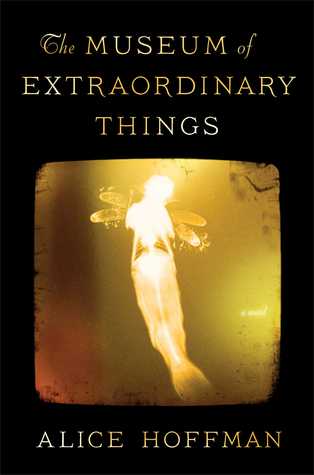 For Coralie, the extraordinary is everyday. Her father owns and runs the Museum of Extraordinary Things, a small exhibit on Coney Island that some would term a "freak show," featuring people with various kinds of abnormalities, including Coralie herself. Born with webbed fingers, she performs as a mermaid in her father's exhibit, along with a "wolf man," a "butterfly girl," and various other oddities. Coralie is kept on a tight leash, and she dreams of knowing more about the world, a desire that is only further fueled when she glimpses a young man in the woods one night while she's pretending to be a river monster on her father's orders.
For Coralie, the extraordinary is everyday. Her father owns and runs the Museum of Extraordinary Things, a small exhibit on Coney Island that some would term a "freak show," featuring people with various kinds of abnormalities, including Coralie herself. Born with webbed fingers, she performs as a mermaid in her father's exhibit, along with a "wolf man," a "butterfly girl," and various other oddities. Coralie is kept on a tight leash, and she dreams of knowing more about the world, a desire that is only further fueled when she glimpses a young man in the woods one night while she's pretending to be a river monster on her father's orders.Eddie (born Ezekiel) Cohen is a photographer scraping by in New York City with his trusty pit bull Mitts. As a child, he worked first in garment factories with his father, and then as a sort of child investigator, which played on a knack he has for finding things. Following the terrible Triangle Shirtwaist Factory Fire, which Eddie photographed, a man approaches him asking Eddie to help find his daughter, who has been missing since the day of the inferno but who doesn't appear to have been a victim of the flames. This request sets Eddie and Coralie on a collision course, built on the strings of wonder and obsession as Coralie tests the boundaries her father has set and Eddie tries to solve the mystery of Hannah Weiss.
The writing in this varies between tell-y and absolutely beautiful, and part of that is due to the way the narrative is set up. The chapters alternate between Coralie and Eddie. Each chapter begins with a long section of italicized, first-person narration before switching to another section of third-person narration. Switching the perspectives has the dual effect of being cool (it allows us to see into the main characters' minds more easily, while still moving the plot along at a pace that can be hard to accomplish in first-person) and jarring, because the transitions are so abrupt and obvious. But Coralie's sections in particular can be lovely, because she has this strange flipped sense of the extraordinary; to her, the strange is commonplace and everyday things, like the other parks of Coney Island (especially Dreamland) are reasons for wonder, which makes common settings and events seem wondrous to the reader, as well. Additionally, one of the climactic scenes (there are two: one regarding the Hannah Weiss plot and one regarding Coralie) seemed to fall flat, like Hoffman was in such a hurry to get on to the bigger scene that followed that she just glossed over what could have easily been an utterly spine-chilling event. Another minor plot, dealing with Eddie and his father, didn't seem fully wrapped-up to me, but possibly others were satisfied with how that went.
There are also other parts of this book I would have been happier without knowing about, and I don't see that they were intrinsic to the plot. The one that comes most to mind is the Dreamland fire. I can see where Hoffman was going, framing the main narrative with two huge fires in New York, but at the same time, the Dreamland fire bothered me so much (spoiler: animals die, guys) that I really wished it hadn't been included, especially as it didn't seem terribly important to the plot. It made everything very dramatic, I suppose, and I can see where the fire might also have been used as some sort of symbolism for the destruction of Coralie's former life or something like that, but I also felt like the same affect could have been achieved without a slaughterfest of innocent, loyal animals. That one was a major downer for me and definitely tainted the rest of the ending.
Overall, though, I think this was a wonderful book. It's a very different aspect of historical fiction, one that we don't see very often (though it does bear similarities to Palisades Park in some ways), and I enjoyed that. The character of the time and place really come through in addition to the actual, living characters on the page. The supporting cast was well fleshed out, instead of seeming like paper cutouts of people there only to support Coralie and Eddie. I'd probably read this one again, despite the aspects of it I disliked; the pros outweighed the cons by a good deal here.
4 out of 5 stars.
No comments:
Post a Comment